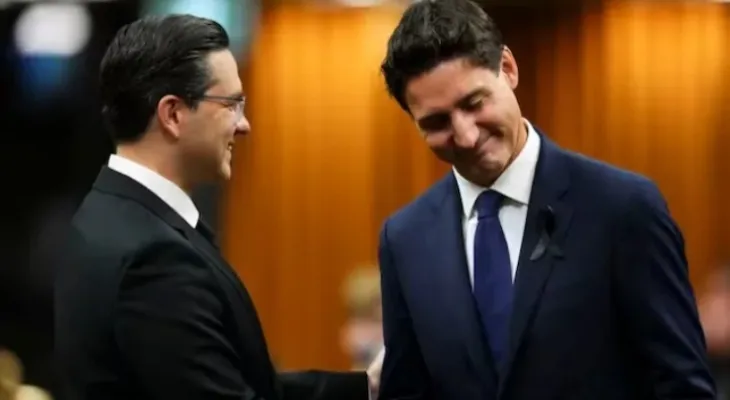Search here
Newspaper
Search here

Arab Canada News
News

Published: August 26, 2023
The issue of housing affordability has become a political litmus test - a debate in which Justin Trudeau and Pierre Poilievre present themselves and how they differ from each other.
Despite appearances, there are some important points on which the Prime Minister and the Leader of the Official Opposition agree. For example, both agree that housing affordability represents an urgent problem that requires action - a level of agreement that does not occur regarding climate change.
Both agree that other levels of government are part of the solution. They also agree that federal funding plays a significant role in making meaningful change.
In fact, they even agree that neither has much to offer in terms of benefits.
For his part, Prime Minister Justin Trudeau warned on Wednesday against blaming any single group for the housing crisis in the country, saying the problem "has been brewing and accumulating for decades." He made this remark on the last day of the Liberal cabinet meeting in Charlottetown.
On Wednesday, Trudeau said what Canadians need are "real solutions, not just slogans and buzzwords," in an apparent attack on the Conservative leader. A few hours later, Poilievre stated that Canadians are receiving more speeches, more photo ops, and more goodwill.
Coincidentally, Poilievre was also speaking at his photo op at the time, where he called reporters to the foyer of the House of Commons, where he stood in the glass-door hallway leading to the chamber. Poilievre is still avoiding the glasses he wore until recently, but he is now in a collared shirt and tie, expressing his regret for the "housing hell" which he accused the federal government of creating and called on the Prime Minister to summon Parliament so that level-headed MPs could solve the issue.
The House of Commons is also scheduled to reconvene on September 18. If three additional weeks are enough to solve the housing affordability problem in Canada, it is surprising that no one has done so yet. However, Poilievre's step has the advantage of conveying an urgent necessity - and does so in a clearly articulated manner.
In this vein, Poilievre suggested utilizing the time in the House to focus on three things: balancing the budget to lower inflation, eliminating the bureaucracy that makes it difficult to build housing, and selling federal properties to provide more land for development.
In different ways, saying each of these things is easier than implementing them.
Poilievre stated that he would deliver 6,000 buildings to the federal government. The federal government has a program to sell surplus properties for affordable housing – the Federal Land Initiative – launched in 2019 with the stated goal of making 4,000 suitable properties available. Thus, some buildings have been offered for sale, but last year’s parliamentary committee report indicated that the program needs improvement.
Based on projections made last spring, achieving a balanced federal budget in the current fiscal year will require a $40 billion cut in spending. The projected deficit for next year is slightly lower, at $35 billion. If the Conservatives have a detailed list of everything they would cut to return the budget to balance, it will be interesting to see that, regardless of when the House convenes again.
Given the number of countries experiencing high inflation rates, it is also fair to wonder how much inflation, and whether balancing the federal budget will actually lower inflation in Canada.
But aside from the details, there is a subtle consistency in Poilievre's prescriptions, as the Conservative leader prides himself on his ideological conservatism and proposes a plan that reflects the best conservative tenets: reducing the governmental footprint, downsizing the public sector, and limiting regulation.
With Canadians' concerns about housing and living costs, Poilievre clearly sees an opportunity to achieve his ideological goals - and if he succeeds politically, this debate will undoubtedly serve as a gateway to a more conservative federal government in Canada than it has been in the past.
Comments